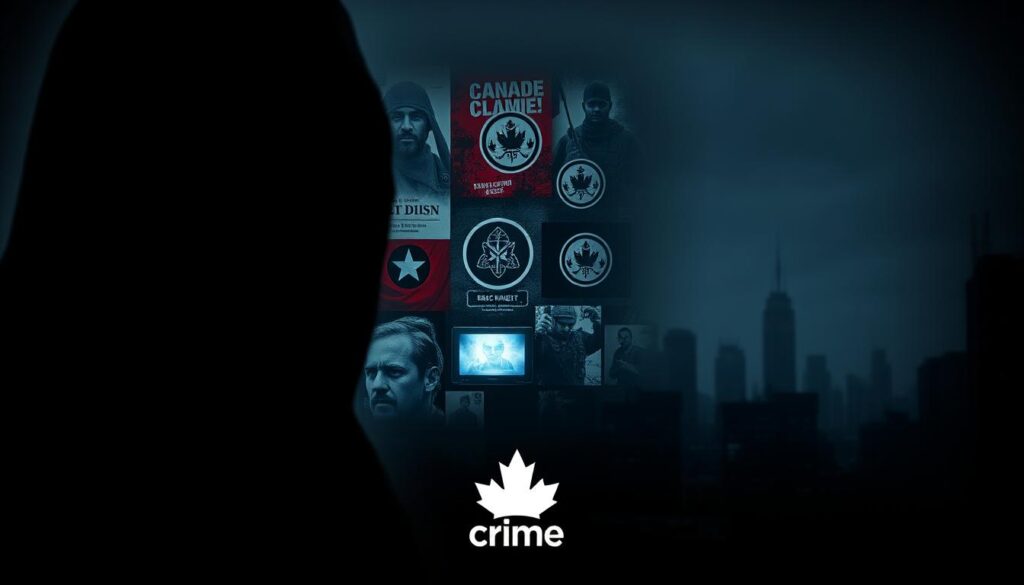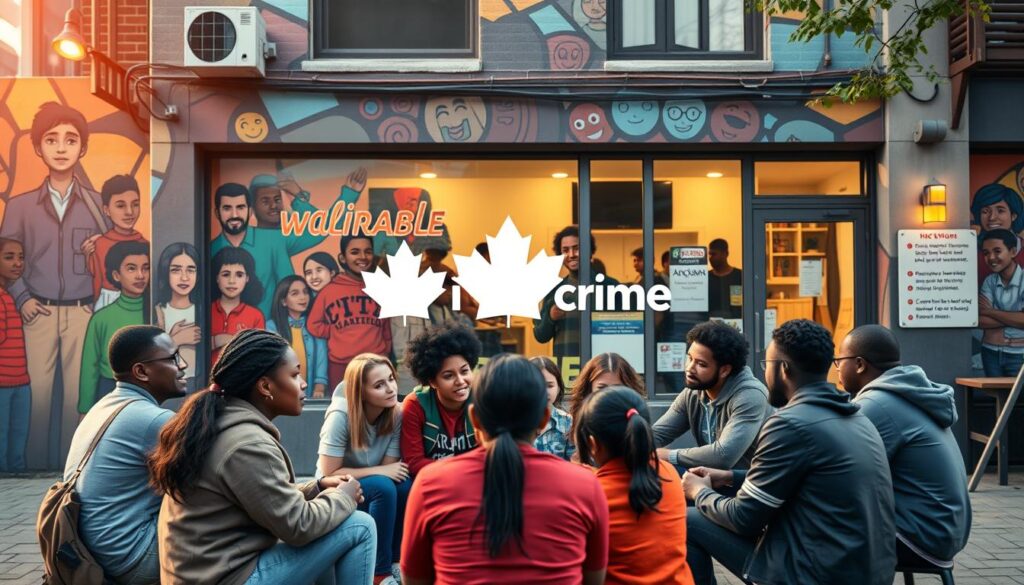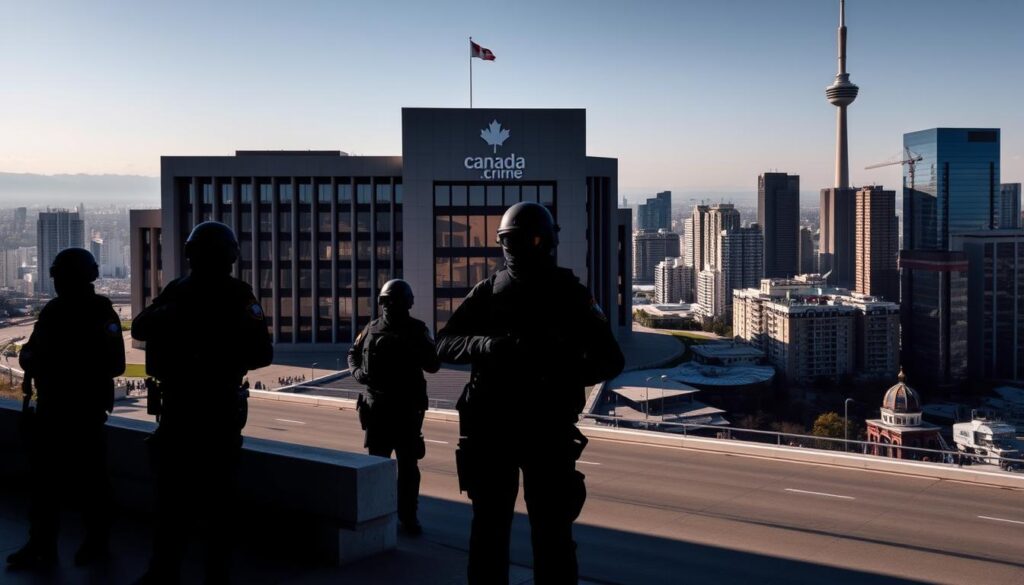Did you know over 190 Canadians have joined terrorist groups abroad recently? This fact shows why we must stop individuals from going overseas to engage with terrorists. By fighting radicalization, you become a key player in protecting your community and our country.
Terrorism is a big worry worldwide, including in Canada. By focusing on education, raising awareness, and working together as a community, we can cut down the risks. Let’s walk through how to prevent these dangers and keep an eye out for radicalization.
Understanding the Terrorist Threat to Canada
Canada’s security world has changed a lot because of increased terrorist threats. Events like the Air India bombing have marked history. Now, the focus is on scattered, extremist threats. These changes are key in shaping how Canada fights radicalization today.
The Evolution of Terrorist Activity
Terrorism in Canada has changed over time. It started with big, planned attacks. Now, it’s more about smaller, scattered acts driven by different beliefs. Since 2015, over 300 Canadian groups with far-right views have appeared. This shows why it’s important to keep a close eye on radicalization.
The Canadian Security Intelligence Service (CSIS) sorts these threats into three types: religious, political, and ideological extremism. This helps in dealing with them effectively.
Key Terrorist Incidents Impacting Canada
Some major events have shown how serious terrorist threats are in Canada. The bombing of Air India Flight 182 in 1985 was a huge attack. It showed the need for tight security. Recently, online hate, like against Jewish people, has doubled since 2017. Terrorists are using the internet more to find and influence people.
For more information, visit this source.
| Terrorist Activity Type | Example Incidents | Response Strategies |
|---|---|---|
| Religiously Motivated (RMVE) | Anti-Semitic incidents | Public awareness campaigns |
| Politically Motivated (PMVE) | Far-right extremist groups | Legislative actions |
| Ideologically Motivated (IMVE) | Online radicalization | Counter-terrorism units |
Recognizing Terrorist Recruitment Tactics
Terrorist groups use advanced ways to draw in individuals, playing on their weak spots and issues in society. It’s important to know how they work to spread their messages. This can help increase awareness of terrorist propaganda and strengthen counter-extremism measures. Such steps are vital to protect those at risk.
How Terrorist Groups Target Vulnerable Individuals
Terrorists often target people facing tough times, like personal or financial problems. They may offer them a feeling of community or a higher purpose. This approach is especially tempting for young people, new arrivals in a country, or those feeling alone. These individuals might not have strong networks of support around them.

| Target Group | Recruitment Tactic |
|---|---|
| Youth | Promises of adventure and significance. |
| Recent Immigrants | Exploitation of cultural dissonance and isolation. |
| Isolated Community Members | Provision of familial-like support and security. |
Online Radicalization and Propaganda
The internet is a key tool for spreading extremist beliefs. Terrorist groups use social media, discussion forums, and secret messaging apps to reach out. They can share their views worldwide, find new followers secretly, and plan without being caught. Knowing how they use the internet for propaganda is crucial. This knowledge is important for setting up successful counter-extremism measures.
Importance of Awareness and Education
Understanding the role of education in stopping radicalization is key. It helps build a strong society that fights against extreme views. By keeping an eye out for radicalization, we make sure people know what to do.
Educational Programs to Combat Radicalization
Educational efforts are vital in fighting extremism. Canada has seen success with programs that educate the youth. The government’s Anti-Racism Strategy is one example. It tackles systemic problems through education and law changes.
This approach works, as shown by the numbers. Education can lower the chance of returning to radical views by 31% in certain areas. Through these programs, young individuals learn about the risks and signs of being radicalized.

Community-based Awareness Initiatives
Community actions also play a big part. Local groups and organizations work together to teach and strengthen communities against radical thoughts. Such engagement has led to a significant decrease in hate acts in some places.
Websites like canadacrime.ca give tools to report hate and get help. This increase in awareness and reporting means more hate crimes are being shared with the authorities.
A combined effort of education and community work is needed to stay alert against radicalization. Together, these approaches can make our society more secure and informed, standing strong against extremism.
Community Engagement for Countering Extremism
Working together is key to fight extremism. When we join forces, we can stop the spread of harmful ideas. To do this well, we need to be aware of terrorist propaganda and get everyone involved.
Building strong relationships is important. Community groups, local governments, and police can work as a team. By working together, they can spot and stop dangers early. This teamwork helps us respond quickly to threats.
The Government of Canada sees how crucial this is. They’ve started the Community Resilience Fund to help. The National Strategy on Countering Radicalization gets everyone involved. Police, teachers, and community heads unite to fight extremism.
Workshops and training teach us about terrorist propaganda. They give us tools to spot and report anything wrong. Open talks and trust in each other help fight the roots of extremism.

It’s also critical to talk easily with law enforcement. Hotlines and online tools help us report problems. Community officers can guide us. This builds a network that keeps us safe and stops radical thoughts.
Creating strong communities is the best way to combat extremism. Getting everyone involved makes Canada more resilient. With ongoing support and working together, we can achieve a safer, more connected society.
Canadian Anti-Radicalization Efforts
Canada has developed prevention strategies to fight radicalization. These initiatives protect the nation from terrorism and keep it safe.
Government Strategies and Policies
The Canadian government has created policies to stop radicalization at its source. These include community programs, education, and watching for threats. They aim to catch problems early.

The Canada Centre for Community Engagement and Prevention of Violence leads these efforts. It brings different groups together to stop radicalization and build stronger communities.
Partnerships with International Allies
Canada works with international allies to improve its anti-radicalization work. It partners with the Five Eyes Alliance to share intelligence and resources. This helps protect everyone better.
Working with other countries is key to stopping threats from abroad. This cooperation ensures Canada’s actions meet worldwide standards. By joining forces, Canada and its allies are more effective against extremism.
Legal Framework and Law Enforcement Measures
Canada’s legal framework is key to fighting terrorism. It uses important laws like the Anti-terrorism Act and the Combating Terrorism Act. These laws and empowered law enforcement help stop terrorist activities and boost measures against extremism.
The Anti-terrorism Act
The Anti-terrorism Act is vital in stopping, investigating, and prosecuting terrorist acts. Created due to growing global threats, it lets authorities stop terrorist plots, track their money, and share intelligence better. It plays a big role in preventing terrorist recruitment, making Canada proactive against threats.
The Combating Terrorism Act
The Combating Terrorism Act plays a big part in Canada’s fight against terrorism. It focuses on those who go overseas for terrorism and sets tough penalties for these actions. This law fills gaps in earlier laws, giving law enforcement tools to stop and prosecute terrorists. It strengthens efforts against extremism.
Role of Law Enforcement Agencies

Agencies like the RCMP and CSIS are crucial in Canada’s counter-terrorism efforts. They work together to watch for terrorist recruitment, investigate deeply, and work with others worldwide to break up terrorist groups. These agencies are key in making the laws work and keeping the country safe.
Counter-Extremism Measures and Initiatives
Fighting terrorism means taking big steps at different levels of society. Canada uses a mix of counter-extremism measures to stop people from becoming radicalized. Prevention strategies reach out to both communities and the nation, aiming for early intervention and education.
To fight against radical ideas, it’s key to make communities stronger. The Community Resilience Fund helps pay for local projects. These projects build unity and fight against violence.
Canada also works with countries around the world. By teaming up with groups like the United Nations and the Global Counterterrorism Forum, Canada boosts its fight against terror.
Canada believes in being open about its security work through the National Security Transparency Commitment. This open approach helps people trust and understand the country’s efforts against extremism.
- Community Resilience Fund
- International Collaborations
- National Security Transparency Commitment
Here’s a table showing Canada’s main counter-extremism measures and their results:
| Measure | Key Initiatives | Outcomes |
|---|---|---|
| Community Engagement | Community Resilience Fund | Increased community cohesion and resilience |
| International Cooperation | Partnerships with UN and Global Counterterrorism Forum | Enhanced global counterterrorism strategies |
| Transparency Efforts | National Security Transparency Commitment | Increased public trust and understanding |

Tips to Prevent Leaving Canada to Participate in a Terrorist Group
We can cut down on the number of people thinking about joining terrorist activities. This guide provides key tips. It talks about how to spot signs of someone heading in that direction, how to help them, and why it’s critical to use available resources and helplines.

Recognizing Signs of Radicalization
Spotting early signs of radicalization is vital. Watch for unexpected changes in how someone acts, speaks, or who they hang out with. Showing a lot of interest in extreme beliefs or pulling away from loved ones should worry us.
Supporting At-risk Individuals
It’s crucial to support someone who might be at risk. Talking openly and giving them emotional backing can steer them away from bad choices. Suggesting they join local events can help them feel valued and connected.
Utilizing Resources and Helplines
A key strategy is using resources and helplines. Places like the Canadian Centre for Community Engagement and Prevention of Violence are there to help privately. Helplines provide advice and using them can truly make a difference.
| Organization | Contact Information |
|---|---|
| Canadian Centre for Community Engagement and Prevention of Violence | 1-800-420-5805 |
| Public Safety Canada | 1-800-830-3118 |
Following these tips can keep both individuals and the wider community safe. By being alert and utilizing resources and helplines, we all can stop extremist actions.
Conclusion
The journey to understand and tackle terrorism in Canada is complex. It requires our full commitment. We must keep up with how terrorist activities change and how they recruit people. This helps us protect our community from radicalization.
Being aware and educated is vital in fighting radicalization. Educational programs and community efforts are key. They help spread knowledge that can prevent it. Canada’s fight against radicalization involves both government and communities. They focus on preventive actions and working with international partners.
Our laws and law enforcement setup help respond to terrorist threats. Acts like the Anti-terrorism Act and the Combating Terrorism Act show the depth of this strategy. It’s important for communities to get involved and help those at risk. Stay alert and support Canadian efforts against radicalization. This keeps our nation safe and upholds our values.

